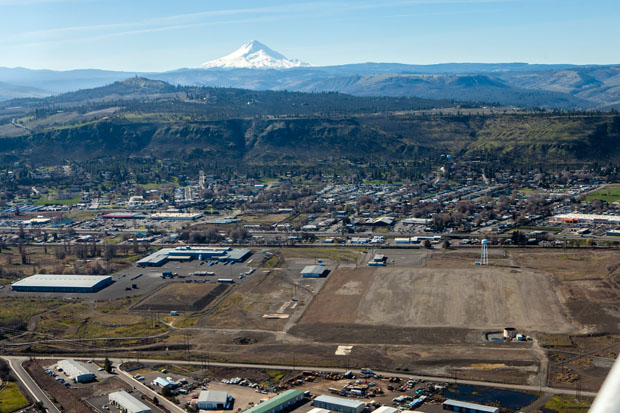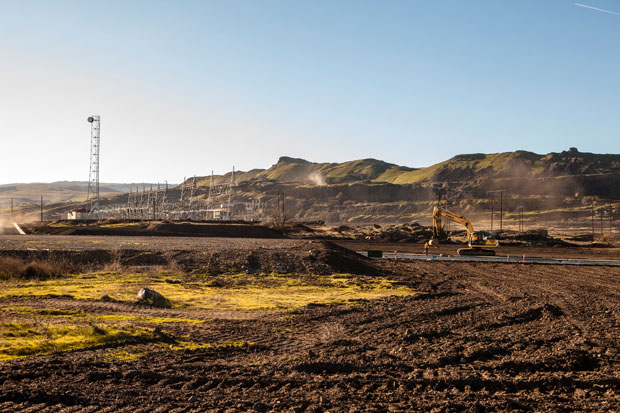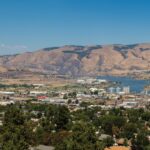BY SOPHIA BENNETT
The Port of The Dalles has run marine facilities since the 1930s, but they are part of a larger mission to strengthen the local economy. They focus on regional economic development with a strong bent toward adding good-paying jobs in high tech, manufacturing and other industries.
BY SOPHIA BENNETT
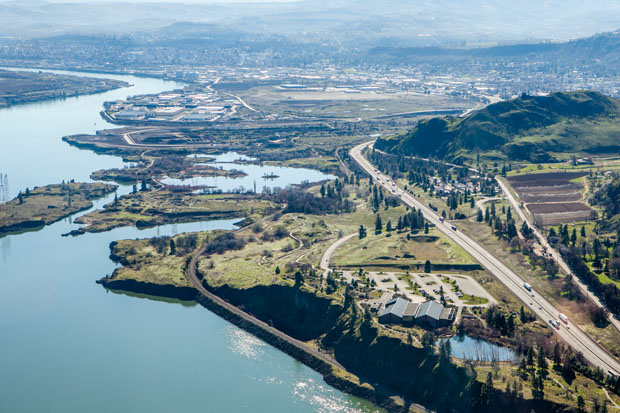
The Port of The Dalles hopes a new 26-lot industrial site will bring jobs to the community.
In 2007 The Dalles found itself in a position not uncommon for residents of the Columbia River Gorge: between a rock and a hard place.
The city needed to add more industrial space to meet its Oregon Building Lands Inventory requirement. To do that, they wanted to expand their urban growth boundary.
The problem? The Dalles lies within the Columbia River Gorge National Scenic Area. The Dalles was the first community seeking to expand its boundary since the scenic area was established. Because there were no processes in place, they entered into negotiations with the Gorge Commission to find a compromise.
By 2013 the two bureaucracies still hadn’t come to an agreement. So the Port of The Dalles did what it does best: swooped in with an alternative. The Port had a site that could be developed right away. They’d been sitting on it for a long time because, as executive director Andrea Klaas explains diplomatically, “it has a very stable subsurface structure.” In other words, the ground was solid basalt. It would take more than a couple of backhoes to get it ready.
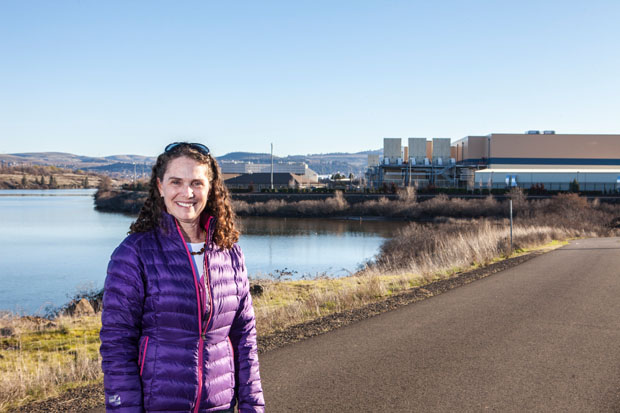
Executive Director Andrea Klaas stands on the Riverfront Trail, which bounds the Port of The Dalles’ new industrial park overlooking Google’s data center.
But the port decided to forge ahead. The result is 26 -shovel-ready lots within a stone’s throw of the Columbia River. The industrial park pays special attention to the infrastructure needs of businesses as well as protects the region’s rich natural resources.
“One of the things I wanted to try to do with this project was have it be really focused on sustainability,” Klaas says. The Port will put in landscaping that features native, drought-tolerant plants. Bioswales will handle all the stormwater runoff. Businesses interested in developing LEED-certified buildings can also take advantage of the great solar gain from over 300 sunny days a year.
The Port of The Dalles has run marine facilities since the 1930s, but they are part of a larger mission to strengthen the local economy. They focus on regional economic development with a strong bent toward adding good-paying jobs in high tech, manufacturing and other industries.
The Port district is large. It runs west to the Hood River County line, east to the Deschutes River and south almost to Tygh Valley. Klaas appreciates that this large geographic area lets her look at economic development from a broader perspective.
“We are one economy,” she says. “It doesn’t make any sense for me to focus just on this little area of the Port district and not understand what’s happening regionally or with my partners across the river. Because if they bring a business over there, it’s a benefit to the district here. We try to work pretty cooperatively. And I’d say we’re on pretty friendly terms.”
She gets no argument from Rolf Anderson and Chuck Covert, who manage the Columbia Gorge Regional Airport in Dallesport, Washington. The airport had plans to create its own 17-lot industrial park, but needed to develop a well to provide water to the site. All its available resources were tied up in repairing and upgrading its runways, taxiways and lighting.
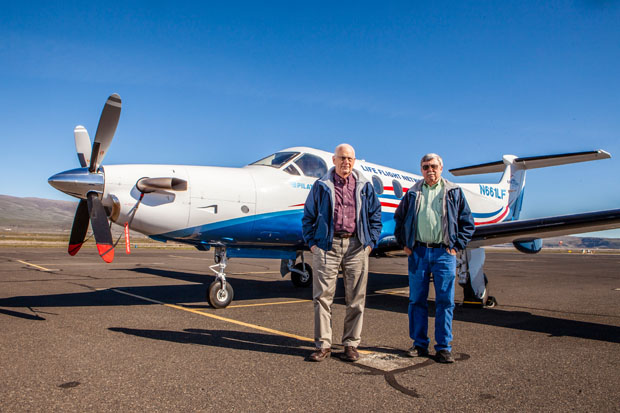
The Columbia Gorge Regional Airport, managed by Rolf Anderson and Chuck Covert, also has a new industrial site, which will be marketed in partnership with the Port of The Dalles.
The Port helped out by loaning the airport the money it needed. Now that the industrial park is completed, they will partner with Anderson and Covert to market it. “The Port can refer businesses to the airport if it makes more sense for them,” Anderson says. For example, companies in the growing unmanned aerial vehicle industry might appreciate having direct access to a runway. While the Port sells most of its lots, the airport plans to lease theirs, which may be a better fit for some businesses. And since the airport is co-owned by the City of The Dalles and Washington’s Klickitat County, people locating there can take advantage of economic development loans, grants and resources from both Oregon and Washington.
Robert Wallace, the newly elected mayor of Dufur, is also grateful for the Port’s assistance. Located in the southern part of the district, this small farm town hopes to draw businesses that complement home-grown Azure Standard, a large natural food distribution company.
The Port’s Kathy Ursprung is working on one effort that could yield benefit in Dufur and other rural areas of the county. She is working to establish a food co-op in The Dalles that could open new markets for rural farmers. It could include a grocery store, commercial kitchen for value-added agriculture production, even space for educational seminars.
Add in Dufur’s availability of irrigated farmland inside and outside the city limits, and there are plenty of opportunities for new jobs in agriculture and value-added food processing.
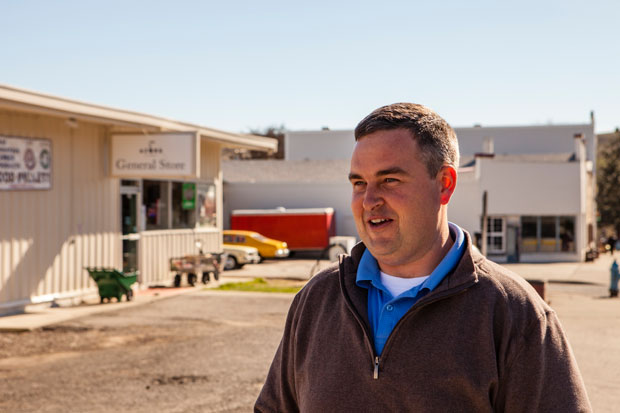
Mayor Robert Wallace hopes to attract new businesses to Dufur’s Main Street.
Wallace points out three buildings along Main Street that he would like to see renovated or torn down: an old barnwood structure, a flat-roofed gray house and a storefront without a floor. But, he says, “It’s like the chicken and the egg with these facilities.” Should they try to attract a business and let them do the renovations, or fix up the buildings and hope a company will want to move in?
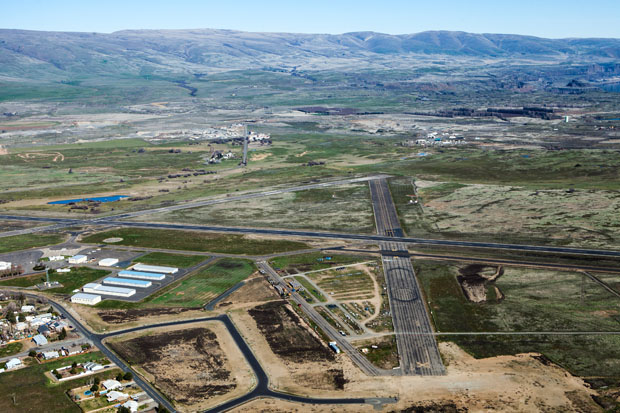 |
Top: The Port of The Dalles’ |
“The city and the Port working together is going to be key to making this whole thing work,” Wallace says. He sees the Port as a key partner in advising the city on its best course of action, finding new businesses and providing financial support. “They may have capital to help us take a building that’s not currently being used and either buy it or renovate it.”
Back in The Dalles, Klaas walks the rough ground at the new industrial park in her purple coat and black high heels (“I’m often teased about my inappropriate footwear,” she says). Local economic development efforts have been helped along by many things, she reports. The Gorge is a beautiful place to live and work. It has great access to major roadways, rail and the river. It has amenities like high-speed Internet access, cheap power and excellent medical facilities.
But much of the region’s success rests with the Port’s efforts over the past 80 years. Klaas stops to look at an osprey nest sitting atop a pole next to the river. That pole used to reside in the middle of one of the industrial lots.
She could have ordered her crew to knock it down, but she couldn’t bear the idea. Instead, she hired a crane to move the pole out of the way. The birds were pretty angry, she says, but they calmed down after a couple of days. The next year they hatched a clutch of chicks.
“That’s my $4,000 osprey nest,” she says with a laugh. And a lasting reminder that at the Port of The Dalles, there’s a good solution for almost everyone.
